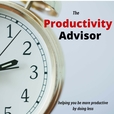
Summary: <br> Strategic Scheduling<br> Do you find it difficult to make time to work on the thingsthat are important to you?<br> Are you trying to squeeze more into each day?<br> Do you wonder where your working time goes?<br> You may be surprised to know that the average worker spends 28% of their time dealing with emails.<br> The average working day now extends from 7am – 7pm as technology means we are always connected.<br> The average smartphone user spends 58 minutes a day checking their phone and they are, on average, never more than 3’ away from it. We’re probably closer to our smartphones than we are to our partners/loved ones.<br> Do you recognise some of yourself in the stats above? I’m sure we all do but that doesn’t make them less scary does it? Add to that time for commuting and meetings and it’s easy to see how our work week can easily rush by without us feeling we have achieved the things we want to.<br> One of the answers to having not enough might seem to do more things simultaneously – multitasking. Lots of people are proud of their multitasking ability and of course we all know that women are better at this than men! The only problem is that multitasking is a very inefficient way to work. It feels good because we trigger the happy signals in our brain. We feel busy, important and in demand which can all help boost our sense of self.However, multitasking is exhausting both mentally and physically. Not only does it require huge amounts of brain energy it also requires time to “switch”between tasks. This switching time is less in women, than in men – giving rise to the women are better at multitasking thing. However, losing time as we switch between tasks isn’t an efficient way of working. Just think of a factory with a production line flowing effectively. It wouldn’t be efficient to stop it and change what was being produced every few minutes, yet that’s what we expect our brains to do when multitasking. No wonder we often make mistakes and end up feeling drained and exhausted.<br> Not convinced doing lots of things and being alwaysavailable is a problem? Well some research by the <a href="https://www.newscientist.com/article/dn7298-info-mania-dents-iq-more-than-marijuana/">Universityof London</a> showed that this type of information overload “info-mania” asthey describe it can cause an effect on your IQ similar to smoking marijuana,which I’m sure you would agree isn’t the most productive state to be in.<br> So if multitasking isn’t the answer then surely throwing more hours at projects must be the right way to go. We can easily cut down on some sleep, miss our breaks and stay glued to our working space slogging away to get more done. If this was the case then Greece and Mexico would be the two most productive countries in the world or 46.6 per week (based on 48 working weeks per year). Germany, Norway, The Netherlands and Denmark are at the other end of the spectrum entirely. The average working hours in Germany are 1363 per year, or 28.3 per week (based on 48 working weeks per year).<br> As this handy <a href="http://blog.pgi.com/wp-content/uploads/2014/07/Winding-down-the-work-week_PGi.png">infographicfrom PGI</a> shows productivity nosedives the more hours we work, dropping from over 50% for those with the lowest hours to less than 10% for those with the longest working hours. Add into that thefact that those countries with the shortest working hours Finland, Denmark,Norway are also noted for being some of the <a href="http://worldhappiness.report/summary/">worlds happiest</a> over a consistent period of time. In some countries the push to throw more hours at things has resulted in that unfortunate game of “who can be at work the longest/latest”. It’s not a great game because there aren’t really any winners, just more burnout, poorer productivity and strained personal relationships to deal with too.<br> If multitasking and throwing more hours at things aren’t then answer then perhaps tim
